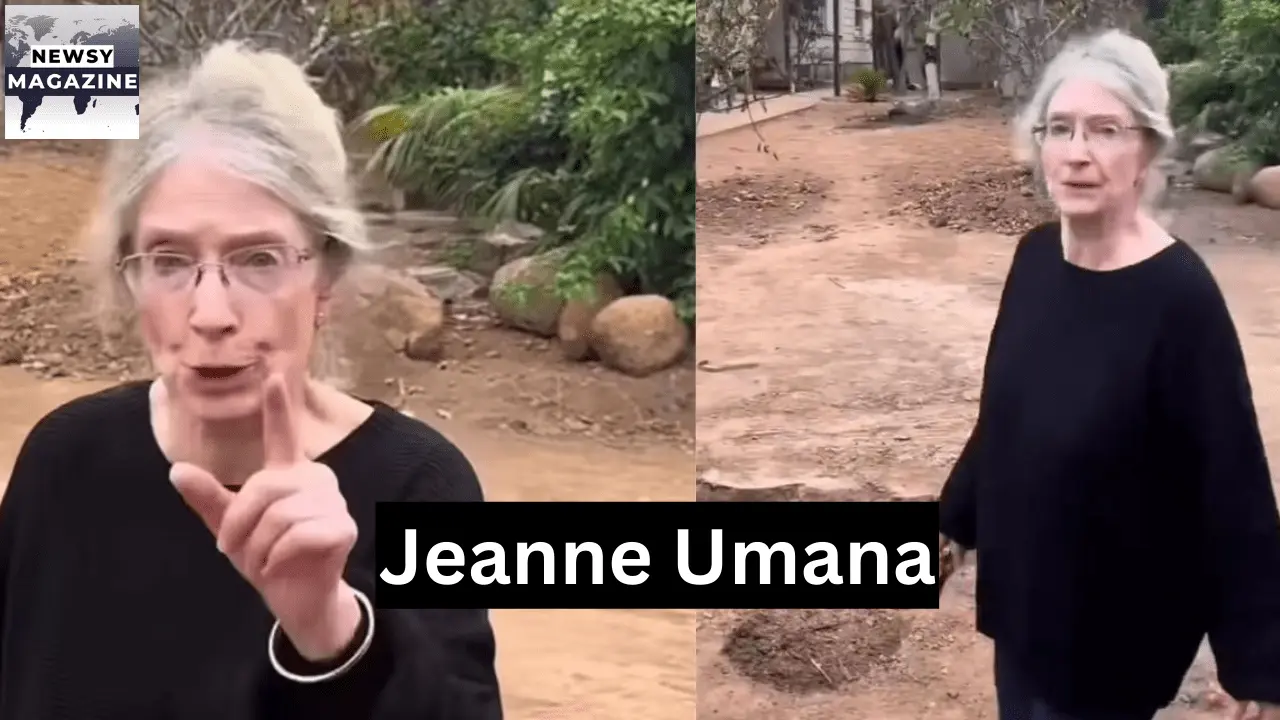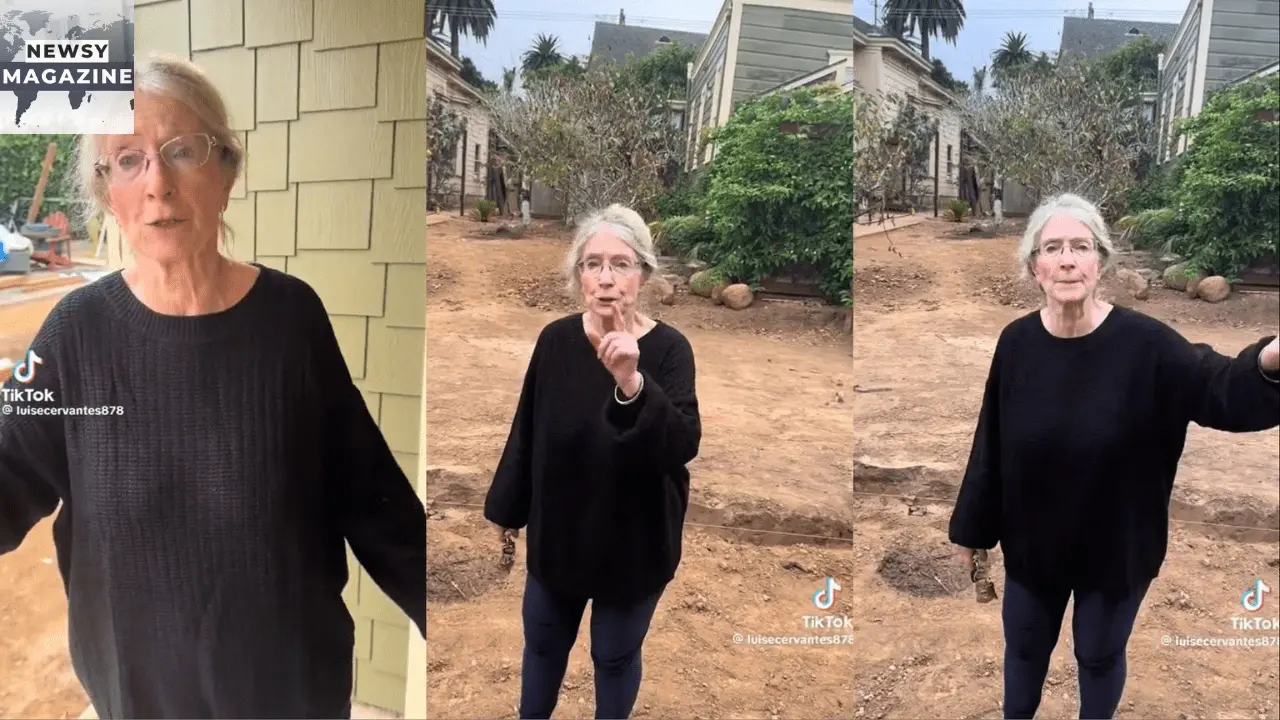
Imagine living in a peaceful town known for its beauty and community spirit, only to have it thrust into the national spotlight because of a shocking incident that reveals deep-seated issues. This is exactly what happened in Santa Barbara when Jeanne Umana, a long-time resident, was caught on camera making racist remarks, sparking outrage and a fierce debate about racism and accountability.
In the tranquil and picturesque city of Santa Barbara, a storm of controversy has erupted, centering around Jeanne Umana. Recently, Umana found herself at the heart of a viral video scandal, accused of making racist remarks. This incident has not only shaken the local community but also gained national attention, sparking intense debates on social media and in public forums. Jeanne Umana, who had previously lived a private life, is now infamous due to her racially charged outburst in a local store.
The video, which spread rapidly across social media, has brought to light underlying tensions and has prompted calls for justice. As the community grapples with the fallout, Umana’s story has become a focal point in the larger conversation about racism in America.
Who is Jeanne Umana?
Jeanne Umana, a longtime resident of Santa Barbara, has largely led a private life. Known in her community, she had never before been associated with public controversies. A woman in her mid-fifties, she is described by acquaintances as a reserved individual who had contributed to local charities and community events over the years. However, the recent incident has dramatically shifted public perception and brought her into the limelight for all the wrong reasons.
The Viral Video Incident

The incident that brought Jeanne Umana into the spotlight occurred in late November 2023. A video surfaced on social media showing Umana engaged in a heated exchange with a local individual. The video, which quickly went viral, captures Umana making racially charged remarks, leading to widespread outrage.
In the video, Umana is seen berating a person of color, using language that many have deemed overtly racist. The content of the video sparked an immediate backlash, with calls for accountability and justice echoing across various platforms.
The setting of the incident appears to be a local grocery store, where tensions escalated over an undisclosed disagreement. Eyewitnesses reported that the argument began over a minor inconvenience, which quickly spiraled out of control. Umana’s remarks were not only inflammatory but also highlighted deep-seated prejudices, leading many to question the underlying social dynamics in Santa Barbara.
Legal Proceedings and Public Reaction
Following the release of the video, Jeanne Umana was swiftly charged with a hate crime. Her initial court appearance was highly anticipated, drawing significant media attention and public scrutiny. However, in a recent development, Umana has pushed her court date to January 2024, a move that has only fueled further debate and speculation.
The delay in her court proceedings has been met with mixed reactions. Some view it as a strategic maneuver by her legal team to buy more time, while others believe it is an attempt to let public outrage simmer down. Regardless of the reasoning, the postponement has done little to quell the intense public interest in the case.
Community and Nationwide Reactions
The incident involving Jeanne Umana has not only rocked the Santa Barbara community but also ignited discussions on a broader scale. Local activists and community leaders have organized rallies and forums to address the underlying issues of racism and intolerance highlighted by the incident.
Santa Barbara, known for its scenic beauty and perceived as a progressive enclave, has been forced to confront uncomfortable truths about racial dynamics within its borders. Community meetings have been held to foster dialogue and understanding, aiming to bridge the gap between different racial and ethnic groups.
Nationally, the case has been picked up by major news outlets, each dissecting the video and its implications. Social media platforms are abuzz with opinions, ranging from calls for severe punishment to debates on freedom of speech and the legal definitions of hate crimes. Prominent public figures and activists have weighed in, further amplifying the discourse.
The Broader Implications
The Jeanne Umana case serves as a stark reminder of the pervasive issue of racism in America. It has sparked a renewed dialogue on the need for more effective measures to combat hate speech and protect marginalized communities. Additionally, it highlights the role of social media in holding individuals accountable and the swift nature of public opinion in the digital age.
This incident underscores the importance of understanding and addressing implicit biases that exist within communities. The case has prompted educational institutions and local governments to consider implementing more comprehensive diversity and inclusion training programs.
Examining the Legal Context
The legal ramifications of the Jeanne Umana case are significant and multifaceted. Charged with a hate crime, Umana faces severe penalties if convicted. Hate crime legislation in California is robust, and aimed at deterring and punishing acts of violence or intimidation based on race, ethnicity, religion, sexual orientation, or other protected characteristics.
Legal experts have pointed out that the prosecution must prove that Umana’s actions were motivated by racial bias to secure a conviction. This involves scrutinizing her language, behavior, and any prior incidents that may indicate a pattern of prejudice. The defense, on the other hand, is likely to argue that her remarks, while offensive, do not meet the legal criteria for a hate crime.
Historical and Social Context
The Jeanne Umana incident can be better understood within the broader historical and social context of racial tensions in the United States. Racially charged incidents are not isolated occurrences; they are part of a long history of racial discrimination and inequality. Santa Barbara, like many American cities, has a history of racial segregation and systemic inequality.
Understanding this context is crucial in addressing the root causes of such incidents. Educational programs and community initiatives aimed at promoting racial understanding and reconciliation can play a significant role in preventing future occurrences.
Media’s Role in Shaping Public Perception
The role of the media in the Jeanne Umana case cannot be overstated. The rapid dissemination of the video on social media platforms played a pivotal role in bringing the incident to public attention. Traditional media outlets followed suit, ensuring that the story reached a wide audience.
The media’s portrayal of Umana has varied, with some outlets focusing on the explicit content of her remarks, while others have attempted to provide a more nuanced view of the incident. This diversity in reporting underscores the media’s influence in shaping public perception and discourse.
The Impact of Social Media
Social media has transformed the way such incidents are reported and perceived. Platforms like Twitter, Facebook, and Instagram have become powerful tools for social justice, enabling rapid dissemination of information and mobilization of public opinion. However, they also come with challenges, such as the spread of misinformation and the potential for online harassment.
In the case of Jeanne Umana, social media played a dual role. On one hand, it was instrumental in holding her accountable and amplifying calls for justice. On the other hand, it also subjected her to intense public scrutiny and online vitriol, raising questions about the balance between accountability and cyberbullying.
The Psychological and Social Impact on Victims
While much attention has been focused on Jeanne Umana, it is crucial to consider the psychological and social impact on the victim of her racist tirade. Victims of hate speech and racial discrimination often experience significant emotional and psychological distress. The effects can be long-lasting, affecting their mental health, sense of safety, and overall well-being.
Support systems, including counseling and community support groups, play a vital role in helping victims cope with the aftermath of such incidents. Highlighting the stories and experiences of victims can also contribute to a more comprehensive understanding of the impact of racism.
Educational and Preventative Measures
In light of the Jeanne Umana incident, there has been a renewed call for educational and preventative measures to address racism and hate speech. Schools, workplaces, and community organizations are being encouraged to implement diversity and inclusion training programs. These programs aim to educate individuals about the harmful effects of racism and promote a culture of respect and understanding.
Moving Forward: Building a More Inclusive Community
The incident involving Jeanne Umana has underscored the need for ongoing efforts to build a more inclusive and equitable community in Santa Barbara and beyond. Community leaders, activists, and residents must work together to address the underlying issues of racism and intolerance.
Initiatives such as community dialogues, educational workshops, and cultural exchange programs can help foster mutual understanding and respect among different racial and ethnic groups. Additionally, local governments and organizations should prioritize policies and practices that promote diversity and inclusion.
Conclusion
The Jeanne Umana case is a poignant example of the complexities surrounding issues of race, justice, and accountability in contemporary society. As her court date approaches, the public will undoubtedly continue to watch closely, eager for a resolution. This case not only impacts those directly involved but also serves as a crucial point of reflection for the broader community.
The ongoing discussions and the eventual outcome of this case will likely have lasting repercussions, influencing future dialogues and policies regarding hate speech and racism in America. Jeanne Umana’s story is a stark reminder of the power of words and the profound impact they can have on individuals and communities alike.
By addressing the root causes of racism and promoting a culture of inclusivity and respect, communities can move forward and create a more just and equitable society. The Jeanne Umana incident, while deeply troubling, provides an opportunity for growth, learning, and positive change.






